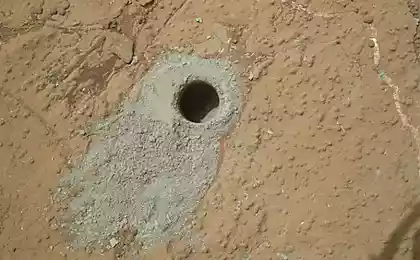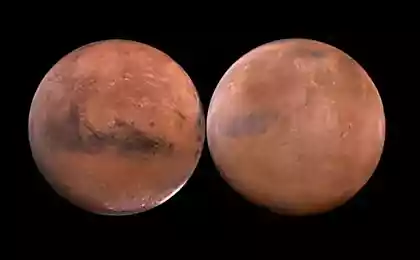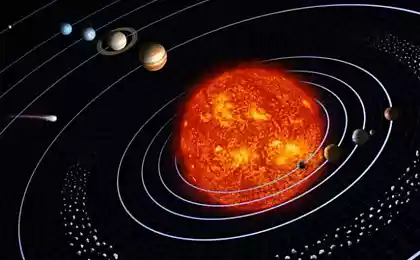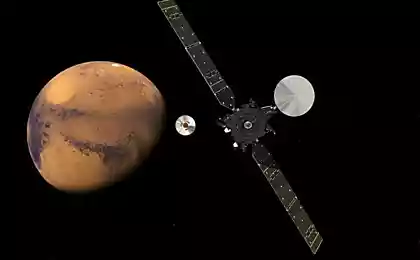183
There is no life on Mars, scientists say
Scientists have confirmed that there has never been life on Mars because of the harsh climate. What about the ancient river beds found on the Red Planet? They are formed by volcanic streams, asteroid attacks and changes in the orbit of the planet. All these conditions did not contribute to the origin of life on Mars, the researchers said.
According to the Daily Mail, the researchers studied hundreds of craters Aeolis Dorsa (the ridges of Eolida) in the area of age 3.6 billion years, near which the rover Curiosity landed. The study, published in the journal Nature Geoscience, said atmospheric pressure on Mars was insufficient to heat the surface above zero - conditions under which rivers begin to flow.
This is not consistent with the assumption that the emergence of liquid on Mars provoked a dense atmosphere that could create a greenhouse effect. Experts analyzed high-quality digital images of 319 small craters taken from the Mars Reconnaissance Orbiter (MRO) interplanetary station to determine the atmospheric pressure of the Red Planet during the formation of meteoric depressions on its surface in the past.
As you know, when passing through the dense layers of the atmosphere, the cosmic body is destroyed. The thinner the atmosphere, the greater the chance of debris reaching the surface of the planet. Dr. Edwin Kite of Princeton University in New Jersey says that the fate of a meteoroid depends on the density of the gas shell it permeates. Thus, the smallest craters found in the beds of Martian rivers contain information about the atmospheric pressure of ancient Mars.
Comparing the size of existing Martian craters with many simulated meteoric depressions formed at different atmospheric pressures, scientists came to the conclusion that in the distant past the atmospheric pressure of Mars was higher than it is now. However, this was not enough to heat the surface of the planet above zero. On Mars, rivers flowed, but for a relatively short time, which may not be enough to maintain conditions favorable for the development of life, scientists said, noting that in the long term, the average temperature on the planet remained below zero.
Kite's colleagues at the Ames Research Center (NASA) in California note the importance of this geological survey, which they say provides a better understanding of planetary atmospheres. The duration of liquid water on the surface of ancient Mars may have played a key role in the origin of life on this planet. This will help solve the mystery of the Red Planet.
Source: brainswork.ru
According to the Daily Mail, the researchers studied hundreds of craters Aeolis Dorsa (the ridges of Eolida) in the area of age 3.6 billion years, near which the rover Curiosity landed. The study, published in the journal Nature Geoscience, said atmospheric pressure on Mars was insufficient to heat the surface above zero - conditions under which rivers begin to flow.
This is not consistent with the assumption that the emergence of liquid on Mars provoked a dense atmosphere that could create a greenhouse effect. Experts analyzed high-quality digital images of 319 small craters taken from the Mars Reconnaissance Orbiter (MRO) interplanetary station to determine the atmospheric pressure of the Red Planet during the formation of meteoric depressions on its surface in the past.
As you know, when passing through the dense layers of the atmosphere, the cosmic body is destroyed. The thinner the atmosphere, the greater the chance of debris reaching the surface of the planet. Dr. Edwin Kite of Princeton University in New Jersey says that the fate of a meteoroid depends on the density of the gas shell it permeates. Thus, the smallest craters found in the beds of Martian rivers contain information about the atmospheric pressure of ancient Mars.
Comparing the size of existing Martian craters with many simulated meteoric depressions formed at different atmospheric pressures, scientists came to the conclusion that in the distant past the atmospheric pressure of Mars was higher than it is now. However, this was not enough to heat the surface of the planet above zero. On Mars, rivers flowed, but for a relatively short time, which may not be enough to maintain conditions favorable for the development of life, scientists said, noting that in the long term, the average temperature on the planet remained below zero.
Kite's colleagues at the Ames Research Center (NASA) in California note the importance of this geological survey, which they say provides a better understanding of planetary atmospheres. The duration of liquid water on the surface of ancient Mars may have played a key role in the origin of life on this planet. This will help solve the mystery of the Red Planet.
Source: brainswork.ru
























